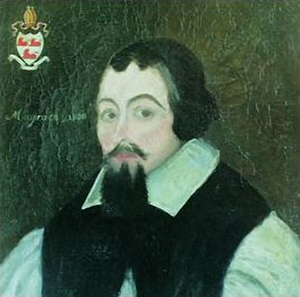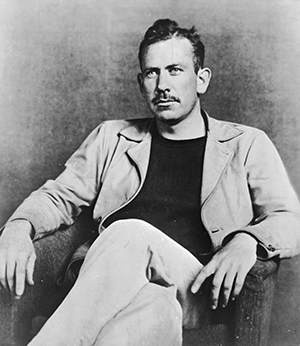On this Day
Published in Issue 6 (November/December 2016), News, Volume 24NOVEMBER

Above: Milar Magrath—a supreme opportunist.
Milar Magrath (aged c. 100), clerical rogue, died. A Franciscan friar who married and fathered nine children, a Catholic bishop who turned Anglican and accumulated a portfolio of bishoprics—famously sitting as both a Catholic and an Anglican bishop over a nine-year period—and a collaborator with Elizabeth I’s anti-Catholic regime, Magrath was a supreme opportunist … and a great survivor, living through ecclesiastical upheaval and two major rebellions. Appointed bishop of Down and Connor in 1565, he took the Oath of Supremacy and was rewarded with the diocese of Cashel in 1571, a post he held until his death. During the Desmond Rebellions he served both sides: enough harassment of the Catholic clergy to placate the Crown and the odd tip-off to keep the rebels at bay. And if his cathedral was described as ‘no better than a hog sty’, he was rewarded with Waterford and Lismore and later Killala and Achonry. During the Nine Years War he again pledged his loyalty, at the same time reassuring his kinsman, Hugh O’Neill, that he would return to Catholicism but ‘had to see to his children’, all of whom held lucrative posts in the see of Cashel, and, of course, his wife, described as ‘a life-long devout Catholic’. Even in his 90s, with his churches in ruins, he was still seeking new bishoprics, or at least what he called a ‘reasonable pension’, being, as he put it, ‘aged, impotent, impaired, and almost quite spent in mind, means and credit’. In the meantime, he was making overtures to Rome, through his Franciscan brethren, about reconverting to Catholicism. There is no evidence, however, of a deathbed conversion.
02/1986
At a Sinn Féin Árd Fheis, delegates voted to change the party’s constitution to allow members to sit in Dáil Éireann. Gerry Adams (37) was elected president.
03/1916
Ninety-seven lives were lost when the SS Connemara, a passenger and cargo steamer, was struck amidships by a coal boat, the SS Retriever, during a storm at the mouth of Carlingford Lough. The only survivor was a non-swimmer.
07/1956
Faced with a UN Security Council resolution, backed by the United States and the USSR, British Prime Minister Sir Anthony Eden was forced to evacuate British troops from Suez.
09/1966
Jack Lynch was elected leader of Fianna Fáil and taoiseach the following day.
11/1926
George Bernard Shaw was awarded the Nobel Prize for Literature.
11/2011
Michael D. Higgins (70) was elected ninth president of Ireland.
12/1216
Some seventeen months after King John conceded Magna Carta to his rebellious barons, a slightly amended version—Magna Charta Hiberniae—was issued for Ireland.
16/1986
Siobhán McKenna (63), Belfast-born stage and screen actor, died.
19/1916
Fr Michael O’Hickey (55), Professor of Irish at Maynooth College (1896–1909), died.
20/1936
General Eoin O’Duffy led c. 600 Blueshirt followers to Spain as an Irish Brigade in support of General Franco and his nationalist rebels in the Spanish Civil War.
22/1916
Jack London (40), American author, notably of The call of the wild (1903), journalist and social activist, died.
23/1966
Seán T. (Thomas) Ó Ceallaigh/O’Kelly (84), president of Ireland (1945–59), died.
24/1926
The first Fianna Fáil Árd Fheis was held.
24/1996
Mícheal Ó Hehir (76), sports commentator, journalist and ‘the voice of Gaelic games’, died.
DECEMBER

Above: John Steinbeck—in 1952 he paid a visit to the home place of his forebears in Ballykelly, Co Derry.
John Steinbeck (66), American novelist and winner of the Nobel Prize for Literature (1962), died. In his early days, Steinbeck spent much of his time on the ranch of his maternal grandfather, Sam Hamilton, whom he described as ‘a courteous big man, with a sweet accent’. Sam was a native of Ballykelly, Co. Derry, who had emigrated at the height of the Famine, married and settled in California. He spoke little about his Irish roots and never returned to Ireland. Steinbeck eventually made the trip himself, along with his wife, in the summer of 1952, to visit the family of Sam’s brother, William, who farmed near Ballykelly. He was not impressed with Derry City, finding it ‘dour and unfriendly’, and likewise his hotel. And for a man who was fond of his drink, he was far from pleased with the strict licensing laws. His quest proved fruitless. Visiting the home place through the help of a friendly taxi man, he was informed that William’s family, two sisters and a brother who never married, were deceased, the last—Elizabeth ‘Minnie’ Hamilton, a lady ‘who was always reading’—having died, aged 84, just two years earlier. He ended his account, published as ‘I Go Back To Ireland’ in Collier’s magazine a few months later, on a poignant note. At their resting place in Ballykelly churchyard, the elderly sexton presented him with a rose. ‘I took it. And that’s the seat of my culture and the origin of my being and the soil of my background, the one full-blown evidence of a thousand years of family. I have it pressed in a book.’
01/1666
Sir James Ware (72), antiquary and historiographer, author notably of Ancient Irish histories (1633), died.
01/1956
Ronnie Delaney (21) won a gold medal for Ireland in the 1,500 metres at the Olympic Games in Melbourne, the first since Bob Tisdall in 1932.
07/1916
David Lloyd George replaced H.W. Asquith as prime minister in Britain’s coalition government.
08/1916
T.K. (Ken) Whitaker, economist and public servant, born in Rostrevor, Co. Down (100 today).
11/1936
King Edward VIII abdicated after a reign of just ten months, prompting the biggest constitutional crisis for the British monarchy in the twentieth century.
14/1966
Walt Disney (65), film producer and pioneer of film animation, died of lung cancer.
17/1936
Pope Francis, born Jorge Mario Bergoglio in Flores, Buenos Aires, the eldest of five children of an Italian immigrant accountant (80 today).
21/1866
Maud Gonne MacBride, nationalist and suffragist, born near Aldershot, Hampshire, the daughter of a British Army officer of Irish background.
22/1916
Around 600 untried Irish internees were released from Frongoch and Lewes jails. Convicted prisoners remained in custody. James O’Kelly, Fenian, war correspondent and MP for County Roscommon, died.
23/1996
Sophie Toscan du Plantier (39), French film producer, was murdered outside her holiday home near Toormore, Schull, Co. Cork.
25/1066
William of Normandy, latterly known as William the Conqueror, was crowned king of England in Westminster Abbey.
30/1916
Grigori Rasputin (47), Russian peasant, faith healer and favourite of Czar Nicholas II and his family, was poisoned with wine and tea cakes, shot and drowned in the River Neva.
30/2006
Saddam Hussein was hanged in Baghdad, having been found guilty of crimes against humanity after a twelve-month trial.
















